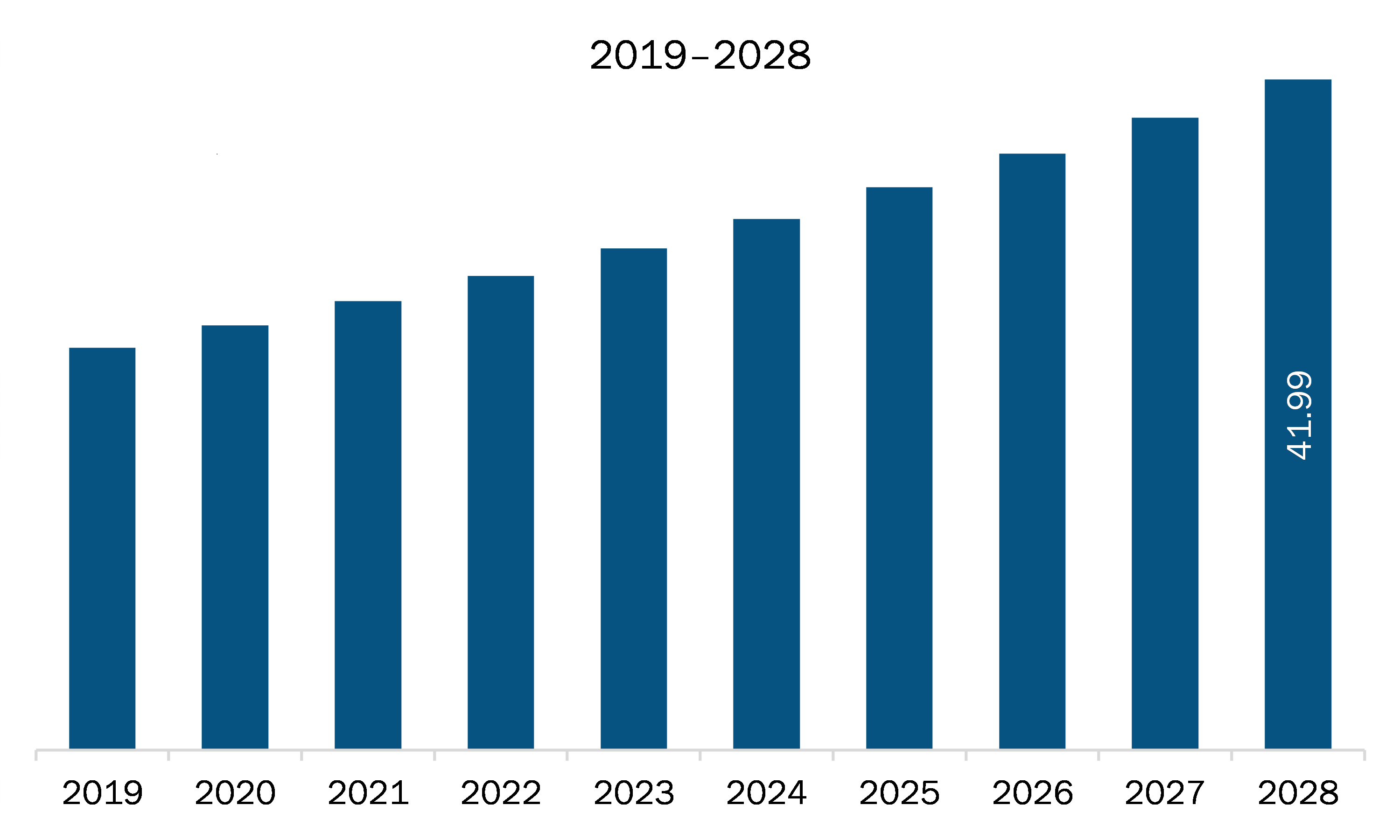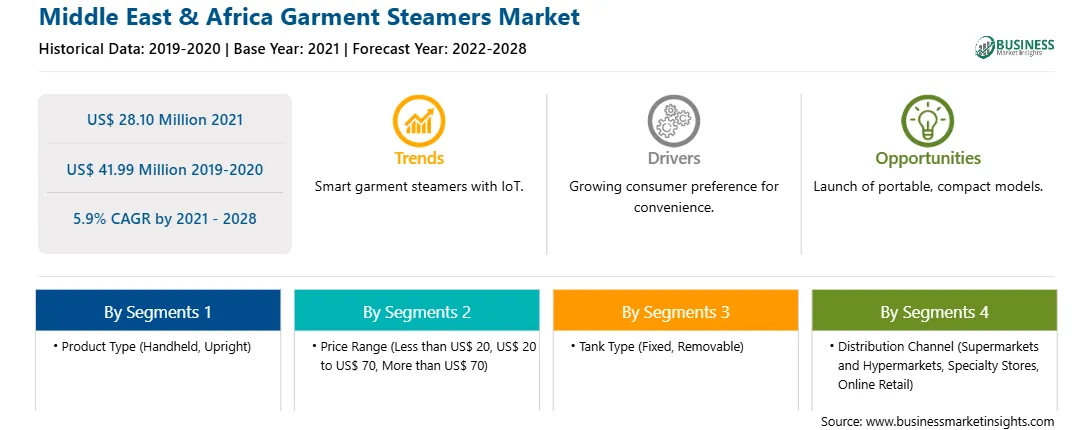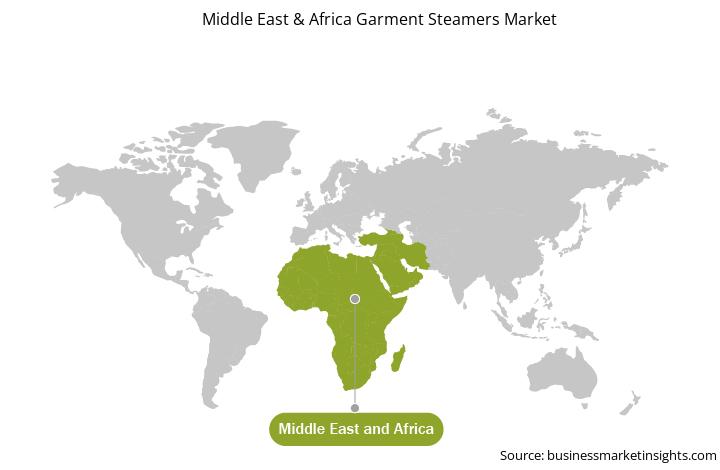Market Introduction
The garment steamer market in the MEA is segmented into South Africa, Saudi Arabia, the UAE, and the rest of the MEA. A few of the MEA countries are facing socio-economic and institutional challenges, such as high unemployment, and low female labor-market penetration rates, whereas some countries are performing financially well. Consumers in the region focus on high-quality products and are price sensitive as they demand garment steamers that provide value for money. Typically, the price of garment steamers ranges from US$ 20 to nearly US$ 250. Different types of garment steamers are available in these price ranges, and the features differ from one to another. For instance, handheld garment steamers are smaller, lighter, and more portable than upright models. However, upright garment steamers are larger and bulkier than handheld models. They have a large water tank in the base, which means they can steam for longer.
South Africa has the highest COVID-19 cases in the MEA, and is followed by Saudi Arabia and the UAE, among others. UAE was the first country in the MEA to report a confirmed case of coronavirus. The impact of lockdown in the MEA countries was that there was disruption in the supply chain along with various manufacturing units being closed down. Along with this, the shutdown of retail outlets led to the reduction in the sale of various household appliances which has negatively impacted the market for garment steamers in the region.
Strategic insights for the Middle East & Africa Garment Steamers provides data-driven analysis of the industry landscape, including current trends, key players, and regional nuances. These insights offer actionable recommendations, enabling readers to differentiate themselves from competitors by identifying untapped segments or developing unique value propositions. Leveraging data analytics, these insights help industry players anticipate the market shifts, whether investors, manufacturers, or other stakeholders. A future-oriented perspective is essential, helping stakeholders anticipate market shifts and position themselves for long-term success in this dynamic region. Ultimately, effective strategic insights empower readers to make informed decisions that drive profitability and achieve their business objectives within the market. The geographic scope of the Middle East & Africa Garment Steamers refers to the specific areas in which a business operates and competes. Understanding local distinctions, such as diverse consumer preferences (e.g., demand for specific plug types or battery backup durations), varying economic conditions, and regulatory environments, is crucial for tailoring strategies to specific markets. Businesses can expand their reach by identifying underserved areas or adapting their offerings to meet local demands. A clear market focus allows for more effective resource allocation, targeted marketing campaigns, and better positioning against local competitors, ultimately driving growth in those targeted areas.
Middle East & Africa Garment Steamers Strategic Insights

Middle East & Africa Garment Steamers Report Scope
Report Attribute
Details
Market size in 2021
US$ 28.10 Million
Market Size by 2028
US$ 41.99 Million
Global CAGR (2021 - 2028)
5.9%
Historical Data
2019-2020
Forecast period
2022-2028
Segments Covered
By Product Type
By Price Range
By Tank Type
By Distribution Channel
Regions and Countries Covered
Middle East and Africa
Market leaders and key company profiles
Middle East & Africa Garment Steamers Regional Insights

Market Overview and Dynamics
The garment steamers market in MEA is expected to grow from US$ 28.10 million in 2021 to US$ 41.99 million by 2028; it is estimated to grow at a CAGR of 5.9% from 2021 to 2028. There has been a rising preference for garment steamers over traditional irons among consumers worldwide due to their various benefits. Garment steamers are typically quicker in removing wrinkles than traditional iron. Along with this, garment steamers are versatile and can be used on different fabrics and styles of garments. Iron has metal plates and is needed to be handled carefully as it can burn various materials. In contrast, the garment steamers only use a steamer to relax materials and remove creases. Garment steamers are increasingly used for delicate materials such as silk, chiffon, lace, wedding dresses, and saris, as well as for formal wear like suits and office attire, as they will not cause any burns or damage any fabrics. A standing, vertical steamer will take up less space in the room and eliminate the need for an ironing board as it includes a hangar where the clothes are hung. Along with this, garment steamers can also be used for quickly providing touch-ups to the clothes. People can use portable and travel steamers on the go. Thus, higher efficiency, portability, flexibility, and ease of use offered by steamers have led to an increased preference for garment steamers over traditional irons.
Key Market Segments
MEA garment steamers market is segmented into product type, price range, tank type, distribution channel, and country. Based on product type, the MEA garment steamers market is segmented into handheld and upright. Upright segment held the largest market share in 2020. Based on price range, the MEA garment steamers market is segmented into less than US$ 20, US$ 20 to US$ 70, and more than US$ 70. More than US$ 70 segment held the largest market share in 2020. Based on tank type, the MEA garment steamers market is segmented into fixed and removable. Removable segment held the largest market share in 2020. Based on distribution channel, the MEA garment steamers market is segmented into supermarkets and hypermarkets, specialty stores, online retail, and others. The supermarkets and hypermarkets segment accounted for the largest market share in 2020. Based on country, the MEA garment steamers market is segmented into Saudi Arabia, South Africa, the UAE, and rest of the MEA. Rest of the MEA held the largest market share in 2020.
Major Sources and Companies Listed
A few major primary and secondary sources referred to for preparing this report on the garment steamers market in MEA are company websites, annual reports, financial reports, national government documents, and statistical database, among others. Major companies listed in the report are Conair LLC; Groupe SEB; Jiffy Steamer Company, LLC; Koninklijke Philips N.V.; Panasonic Corporation.
Reasons to buy report
MEA
Garment Steamers Market
Segmentation
MEA Garment Steamers Market -
By Product Type
MEA Garment Steamers Market - By
Price Range
MEA Garment Steamers Market - By Tank Type
MEA Garment Steamers Market - By Distribution Channel
MEA Garment Steamers Market - By Country
MEA Garment Steamers Market - Company Profiles
The Middle East & Africa Garment Steamers Market is valued at US$ 28.10 Million in 2021, it is projected to reach US$ 41.99 Million by 2028.
As per our report Middle East & Africa Garment Steamers Market, the market size is valued at US$ 28.10 Million in 2021, projecting it to reach US$ 41.99 Million by 2028. This translates to a CAGR of approximately 5.9% during the forecast period.
The Middle East & Africa Garment Steamers Market report typically cover these key segments-
The historic period, base year, and forecast period can vary slightly depending on the specific market research report. However, for the Middle East & Africa Garment Steamers Market report:
The Middle East & Africa Garment Steamers Market is populated by several key players, each contributing to its growth and innovation. Some of the major players include:
The Middle East & Africa Garment Steamers Market report is valuable for diverse stakeholders, including:
Essentially, anyone involved in or considering involvement in the Middle East & Africa Garment Steamers Market value chain can benefit from the information contained in a comprehensive market report.